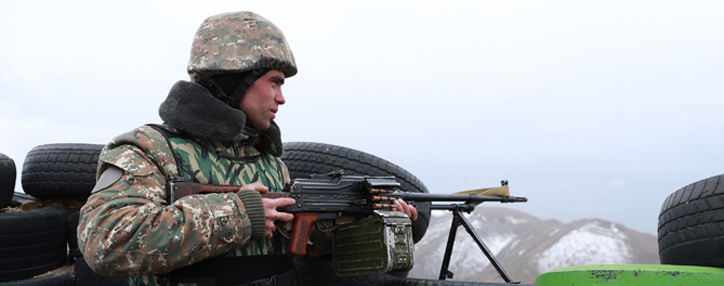Armenian parliamentary majority refuses to discuss border delimitation and demarcation problems

YEREVAN, January 17. /ARKA/. Armenia’s National Assembly, dominated by the Civil Contract party of Prime Minister Nikol Pashinyan, voted today against discussing an opposition-drafted statement on the border delimitation and demarcation problems. The draft statement was backed by 33 lawmakers, while 64 voted against.
"Undoubtedly, the situation on the borders of Armenia and Artsakh (Nagorno-Karabakh) is a cause of serious concern for our people,’ former defense minister Seyran Ohanyan from the opposition Hayastan faction said.
‘The series of defeats continue even after the 44-day war in Artsakh (in 2020 autumn) and it has a direct impact on the situation on our borders,’ Ohanyan said.
"We do not say that we do not strive for peace and that the borders should not be delimited and demarked… We find that haste when it comes to border delimitation will deal a serious blow to the territorial integrity of Armenia, its sovereignty and the right of Artsakh people to self-determination," Ohanyan said.
A member of the parliamentary committee on foreign relations Hripsime Grigoryan, in turn, stated that regarding the border delimitation and demarcation it is in the interests of Armenia not to link that process with the Nagorno-Karabakh conflict settlement.
‘Delimitation and demarcation concern the state borders of Armenia and Azerbaijan, and the problem of Nagorno-Karabakh is not a matter of territorial integrity, but of self-determination of peoples. The connection of these issues does not stem from the interests of Armenia, therefore it is unacceptable for us," Grigoryan said.
On September 27, 2020, Azerbaijani armed forces, backed by Turkey and foreign mercenaries and terrorists, attacked Nagorno-Karabakh along the entire front line using rocket and artillery weapons, heavy armored vehicles, military aircraft and prohibited types of weapons such as cluster bombs and phosphorus weapons.
After 44 days of the war, on November 9, the leaders of Russia, Azerbaijan and Armenia signed a statement on the cessation of all hostilities. According to the document, the town of Shushi, the districts of Agdam, Kelbajar and Lachin were handed over to Azerbaijan, with the exception of a 5-kilometer corridor connecting Karabakh with Armenia.
A Russian peacekeeping contingent was deployed along the contact line in Karabakh and along the Lachin corridor.
Groups of Azerbaijani troops illegally crossed the Armenian state border on May 12, 2021 and advanced about 3 km into Armenia’s sovereign territory in Gegharkunik and Syunik regions allegedly to "adjust the borders." Part of them pulled back later, but some are still in Armenian sovereign territory.
On May 27, Armenian Prime Minister Nikol Pashinyan proposed that Armenian and Azerbaijani troops withdraw from the border areas to the places of their permanent deployment, suggesting that Russia deploy Russian border guards along the Armenian-Azerbaijani border - from Sotk (Gegharkunik) to Khoznavar (Syunik). After that, according to his plan, it will be possible to begin the delimitation and demarcation of the Armenian-Azerbaijani border.
Yerevan demands that the international community respond to the aggressive policy of Azerbaijan, which is directed against Armenia's sovereignty, territorial integrity and regional security. -0-



